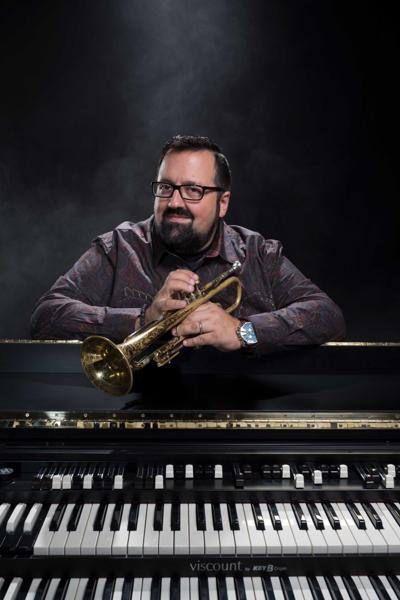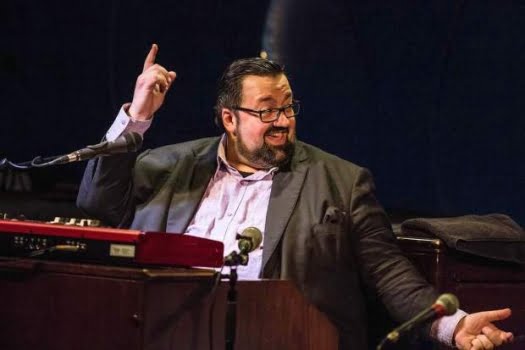Joey DeFrancesco was 17 when Miles Davis called him. His grandmother took a message.
“I came home and she said somebody named Miles called,” DeFrancesco recalled. “I thought it was a joke. Because me and (bassist) Christian McBride — we went to high school together — we used to do all kinds of stuff to each other like that.”
DeFrancesco, a gigging jazz organist since he was 10, called the New York number his grandmother had written down. Davis, one of the most important figures in 20th century music, answered.
“Miles used to answer the phone like this: ‘What?!’ I hung up,” DeFrancesco said. “And I called and hung up two or three times because I could hear it was him. Finally, I got the courage to say ‘Mr. Davis —.’ Miles said, ‘Can you come to New York today?’ ‘Today. I don’t know.’ ‘How ’bout tomorrow?’ ‘Yeah, I’ll be there.’ ”
Immediately after his 1988 stint with Davis, the inspired DeFrancesco emulated the jazz master and picked up the trumpet. The real test of whether he’d stick with the horn came when he played for Davis.
“When Miles heard me play, he really encouraged me,” DeFrancesco said from his home in Arizona. “I said, ‘Wow. I guess I better play this thing.’ ”
DeFrancesco made the trumpet a major part of his music making. A third-generation jazz musician, he’s a singer and composer as well as an organist and trumpeter, and he’s a four-time Grammy nominee.
DeFrancesco and his band, The People, will play Wednesday at the Manship Theatre, as part of the River City Jazz Masters concert series. The People features guitarist Dan Wilson; Troy Roberts, sax; and Michael Ode, drums.
DeFrancesco would have stayed with Davis’ band longer but Columbia Records, the major label that signed him at 16, pressured him to promote the album he’d recorded before he joined Davis.
“When I look back at it now,” DeFrancesco said, “I should have said, ‘No, I’m staying.’ But the good thing was Miles understood. We remained close, up until he left.”
In 2017, DeFrancesco released his most recent solo album, the soul-jazz opus “Project Freedom.” A socially conscious set, the album features interpretations of “Lift Every Voice and Sing,” John Lennon’s “Imagine” and Sam Cooke’s “A Change is Gonna Come.”
And earlier this year, for the latest of his more than 30 albums, DeFrancesco worked with another star, Van Morrison. Released in April, “You’re Driving Me Crazy” combines jazz and blues standards and Morrison originals with DeFrancesco’s sizzling organ excursions and lovely — and likewise technically wowing — trumpet work.
DeFrancesco’s collaboration with Morrison grew from a 2014 engagement he played with saxophonist David Sanborn at Ronnie Scott’s Jazz Club in London. Morrison came to the gig and later suggested that he and DeFrancesco record together.
“It all makes sense,” DeFrancesco said. “When you dive into Van’s body of work, it’s a natural for improvised music. And his knowledge of music is huge. Obscure stuff, too. I’ve always been into that, too. We just hit it off.”
Morrison and DeFrancesco plan to release a second collaboration in 2019.
DeFrancesco grew up near Philadelphia, a city rich in jazz and soul history. The Philadelphia area produced noted jazz organists, including the famous, soul-and-jazz fusing Jimmy Smith and DeFrancesco’s father, “Papa” John DeFrancesco.
DeFrancesco’s first instrument was the toy piano he played at 3. When he was 4, his dad’s Hammond organ and Leslie speaker came home during an extended break from gigs.
“Two keyboards and foot pedals and stuff spinning around in a box,” DeFrancesco remembered. “As soon as I heard that sound, I wouldn’t leave it alone. It was my favorite toy.”
The precocious DeFrancesco sat in with his dad at gigs.
“There were still legendary cats around at the time,” he said. “I got to perform with them. I just knew that I loved playing. I’m still always working on moving to the next level.”
Next year is the 30th anniversary of DeFrancesco’s recording debut, 1989’s “All of Me.” His productivity in the studio, he said, is about “staying fresh, staying at the top of your game, always being wide open to musical possibilities. I’m fortunate that I can be prolific. Fans are waiting to hear to new records. That’s a good thing.”







More Stories
CD review: George Benson – Dreams Do Come True: When George Benson Meets Robert Farnon – 2024: Video, CD cover
The band was tight as ever. The Warren Haynes Band cuts loose: Video, Photos
Interview with Alvin Queen: Feeling Good – I heard these tunes played by … Video, new CD cover, Photos